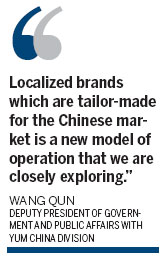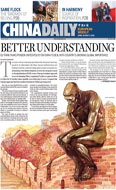Companies
Yum! makes offer to buy out Little Sheep Group
Updated: 2011-04-28 13:22
By He Wei (China Daily)
Both companies said discussions are currently at a preliminary stage
|
|
SHANGHAI - Yum! Brands Inc, the world's largest catering chain group, announced on Tuesday the submission of a preliminary bid to acquire a majority stake in the Chinese hot-pot restaurant Little Sheep Group Ltd.
Yum may bid for all the shares that it doesn't already own or are held by parties acting in concert with it, according to separate releases from Yum and Little Sheep on Tuesday. No formal offer has yet been made, Yum said.
As Little Sheep's second biggest stakeholder, Louisville, Kentucky-based restaurant chain operator Yum held 20 percent of Little Sheep shares in 2009 and increased its stake to 27.2 percent last year.
Little Sheep's controlling stockholder Possible Way International Ltd holds 29.9 percent, or 308 million shares, while the chairman Zhang Gang currently owns 2.4 percent of the company, according to its statement.
Yum said in the release that it will make a formal offer only after obtaining all necessary regulatory approvals for the transaction.
|
||||
Twelve-year-old Little Sheep, with its headquarters in Baotou, Inner Mongolia autonomous region, and listed on the Hong Kong Stock Exchange, owns and operates hot pot restaurants primarily in China, but also has overseas branches in East Asia and North America.
Its annual net income rose 21 percent year-on-year in 2010, according to a company filing in March.
Little Sheep has declined to comment on the details of the ongoing negotiations, as "discussions are at a preliminary stage only", its media officer Liu Jia told China Daily over phone.
Wang Qun, deputy president of government and public affairs with Yum China division, said engagement with Little Sheep started "just in the past few days" and they have set no timeframe for the consultation.
With about half of its locations outside the US, Yum reported last week that first-quarter profit rose 10 percent from last year, mostly driven by robust growth in China.
Owning the Pizza Hut and KFC chains as its flagship brands, Yum also runs East Dawning, a fusion of the western fast-food business model with Chinese cuisines.
Without directly referring to the potential acquisition, Wang said localized brands (such as East Dawning), which are tailor-made for the Chinese market, "is a new model of operation that we are closely exploring".
The company, which opened 92 new restaurants in the mainland in the first quarter of this year, enjoyed a 28 percent rise in revenue to reach $906 million, while same-store sales rose 13 percent in the same period. Wang said the company is considering opening 500 new restaurants nationwide this year and maintaining high-level growth.
As a fierce competitor of Yum, McDonald's Corp has faith in the China market and will not seek to acquire other companies, said Kenneth Chan, the company's China CEO, during an interview with China Daily on Wednesday. McDonald's has vowed to increase its investment in the country by 40 percent in 2011, Chan said.
Bloomberg quoted Mark Kalinowski, a research analyst at Janney Montgomery Scott LLC, as saying the purchase "would further solidify Yum's position as the leading restaurant company in fast-growing China".
But a former industry researcher with Shenyin and Wanguo Securities, who is familiar with the catering business but declined to be identified, said it is hard to predict at this stage whether the purchase will be beneficial for Yum in the long run.
"The catering business can be categorized into fast-food, hot-pot and dinner. The first two are more standardized and easier for cost and scale control. In this regard, Little Sheep is a good object," she said.
"But whether this purchase is a profitable case is determined by the price of the deal and the performance after the deal," she added.
Yum traded at $52.18, down $1.02 or 1.92 percent, on a volume of about 4.54 million shares on the New York Stock Exchange Tuesday.
The stock of Little Sheep gained 0.4 percent to HK$5 (64 cents) on April 21, the last day of trading prior to suspension. It will continue to be suspended from trading in Hong Kong pending a further announcement of the buyout.
Bloomberg News and Gao Changxin contributed to this story.
E-paper

Head on
Chinese household care goods producers eye big cities, once stronghold of multinational players
Carving out a spot
Back onto center stage
The Chinese recipe
Specials

British Royal Wedding
Full coverage of the royal wedding of Prince William and Kate Middleton in London. Best wishes

The final frontier
Xinjiang is a mysterious land of extremes that never falls to fascinate.

Bridging the gap
Tsinghua University attracts a cohort of foreign students wanting to come to China.




